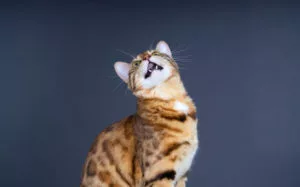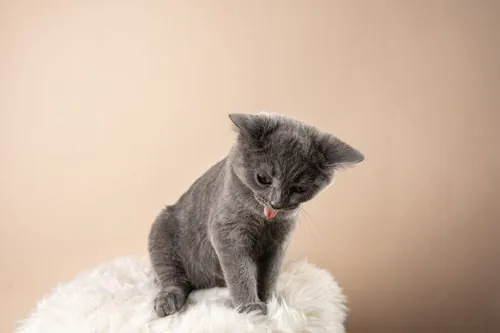Stomatitis in Cats: Symptoms and Treatment
Many medical conditions can suddenly appear in our cats as they age. Unfortunately, one of these conditions can be stomatitis. Stomatitis is a condition that affects around ten percent of the cat population.
Stomatitis is a painful condition that causes inflammation of the mouth in cats. Most of the time the cause of this condition is unknown. Stomatitis is more common in older cats than it is in young cats.
In this article, we will be explaining everything that cat owners need to know about the condition stomatitis in cats. This includes the symptoms of stomatitis in cats as well as how the condition is treated. In addition to this, we will also be answering some other commonly asked questions about this feline medical condition. Let’s get right into it.

What Is Stomatitis In Cats?
Stomatitis in cats is a condition where a cat’s mouth becomes inflamed. This affected the entire mouth including the cat’s gums and mucous membranes. As you can probably imagine, this is a pretty painful disease for cats, and it tends to make simple activities like eating very difficult.
How Do Cats Get Stomatitis?
It is believed that stomatitis is a condition in cats that is caused by an extreme immune response. The exact cause of this unusual immune system response is unknown. However, cats with a history of dental disease tend to be at more risk of developing stomatitis. This suggests that the immune system is responding to the presence of bacteria in the mouth.
Symptoms Of Stomatitis In Cats
The symptoms of stomatitis in cats generally center around the cat’s mouth. Additionally, these symptoms can often appear to be very similar to those of dental disease in cats. Whether you believe that your cat is suffering from stomatitis or dental disease, you should still get them seen by a vet as soon as possible. Here are the symptoms of stomatitis in cats:
1) Foul Smelling Breath
Foul smelling breath is one of the first signs of stomatitis that cat owners notice. This foul breath is usually thanks to a build up of bacteria and plaque on the cat’s teeth.
2) Excessive Drooling
Excessive drooling can also occur in cats with stomatitis. This drooling occurs from the pain that is caused by swallowing. This will lead the cat to drool from swallowing their saliva less often.
3) Lack Of Self Grooming
The pain in a cat’s mouth due to stomatitis will often also lead to a dramatic decrease in self grooming. After all, the process will be painful for a cat with this medical condition.
4) Difficulty Eating
Of course, pain in the mouth will also lead to a cat having difficulty eating. This is especially true if the cat is also being affected by dental disease. This symptom can appear as taking smaller bites of food than usual or favoring one side of their mouth over the other while eating.
5) A Reduced Appetite
In some cases, the mouth pain caused by stomatitis will leave cats with a reduced appetite. In some cats, this can be presented as a cat eating much less often than usual or not eating at all. Additionally, some cats may start only eating wet food as it is often easier for a cat with stomatitis to eat than dry kibble.
6) Strange Behavior While Eating
Cats with stomatitis may also exhibit some strange behavior while eating. For example, some cats may make vocalizations when eating as a result of the pain that they are feeling.
How Is Stomatitis In Cats Diagnosed
Most of the time, stomatitis in cats is diagnosed after a licensed veterinarian examines the cat’s mouth. The inflammation caused by stomatitis is unique to the condition, and it is easily seen by a vet. This inflammation will occur on a cat’s gums, on the inside of a cat’s cheeks, and at the back of a cat’s throat. In addition to this, some cats may also have inflammation of the bone around their teeth when they have stomatitis.
How is Stomatitis In Cats Treated?

Treatment of stomatitis in cats varies depending on the vet and how severe the condition is. Many vets will call for thorough and regular teeth cleanings for the cat. This will reduce the amount of plaque and bacteria in the cat’s mouth, which will hopefully reduce their mouth inflammation as well.
When this does not work, most veterinarians will call for tooth extraction surgery. This will remove the affected teeth, which will usually also reduce their mouth inflammation over time. In minor cases, only a few teeth will need to be removed. However, very extreme cases of stomatitis in cats will require all teeth to be extracted.
What Is The Prognosis For Cats With Stomatitis?
Once the stomatitis has been treated, cats tend to go back to their normal selves. This means that cats can continue to live a long and healthy life, even after tooth extraction surgery.
When it comes to feeding your cat after stomatitis, some vets will recommend that you continue feeding your cat wet food in order to keep them comfortable. Other times, cat owners report that their cat is fine with eating dry kibble again once they have completely recovered from tooth extraction surgery.
Can You Prevent Stomatitis In Cats?
There is no foolproof way to prevent stomatitis in cats. However, feeding your cat a good diet and cleaning their teeth regularly may help prevent them from developing this condition. However, there are never any guarantees when it comes to feline stomatitis.
Can Stomatitis In Cats Be Cured?

Once the cat has undergone a successful tooth extraction surgery, the stomatitis is usually considered to be cured. This is because the inflammation goes down, and the cat’s mouth goes back to normal, once the affected teeth have been removed.
In some severe cases, Stomatitis cannot be cured and will need continuous care through regular teeth cleanings and anti-inflammatory medications. Antibiotics may also need to be prescribed in some severe cases of feline stomatitis.
Conclusion
Stomatitis is a painful condition that affects about 1 in 10 cats as they age. Although we don’t necessarily know the cause for the condition, it can be treated and cured through teeth cleanings and extractions. If you have any questions about stomatitis in cats, speak with your veterinarian.
For cats and cat parents in the Atlanta, GA region, The Village Vets has multiple locations to serve you and your pet. Visit us online to find a location near you!
Recent Posts
About The Village Vets
The Village Vets is a network of animal hospitals based in Atlanta, GA and the surrounding area. We offer honest, excellent service to our clients in a comfortable, friendly atmosphere. To learn more about our locations and how we can better serve you and your pet, click the button below.
Share This Post
Recent Posts
About The Village Vets
The Village Vets is a network of animal hospitals based in Atlanta, GA and the surrounding area. We offer honest, excellent service to our clients in a comfortable, friendly atmosphere. To learn more about our locations and how we can better serve you and your pet, click the button below.



